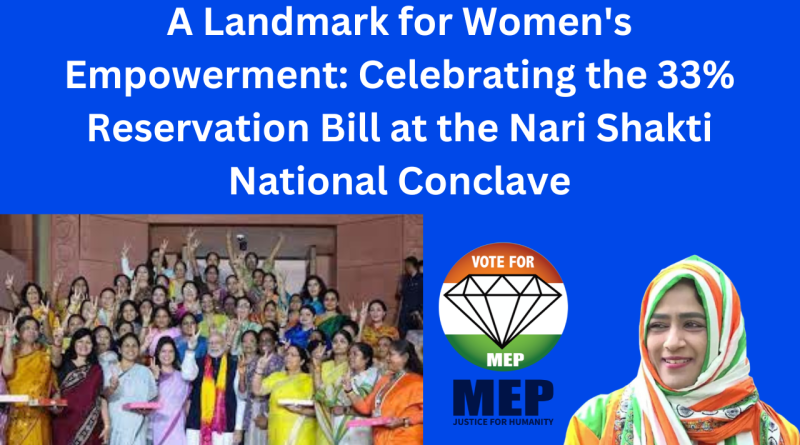A Landmark for Women’s Empowerment: Celebrating the 33% Reservation Bill at the Nari Shakti National Conclave
news india :
Hello, friends! I couldn’t be more thrilled to dive into a topic very close to my heart today. We’re talking about a historic moment that’s not just a win for women across India but a leap towards a more inclusive and equal society. The introduction of the 33% Reservation Bill, celebrated at the Nari Shakti National Conclave 2024, marks a new dawn for women’s empowerment and representation in India. So, grab your cup of tea, and let’s unwrap this milestone together!
Background of Women’s Reservation in India
You see, India has been on a bumpy ride towards achieving gender equality, especially in politics. Despite being a democratic country, the representation of women in the legislative bodies has been less than ideal. But, the tide is turning with the 33% Reservation Bill aiming to reserve a third of the seats in the Lok Sabha and State Assemblies exclusively for women. This idea isn’t brand new; it has been in discussions and debates for decades, making its realization a moment of collective pride and hope.
Overview of the Nari Shakti National Conclave 2024
The Nari Shakti National Conclave 2024 wasn’t just another event. It was a vibrant, dynamic gathering buzzing with energy, ideas, and the spirit of ‘Nari Shakti’ (women power). Picture this: activists, politicians, thought leaders, and ordinary women coming together, united by a common dream – empowerment and equal representation. This conclave wasn’t just about speeches; it was about real conversations on making empowerment a lived reality.
The significance of the 33% Reservation Bill
Imagine a world where decisions affecting half the population are taken without their adequate representation. Hard to think of, right? The 33% Reservation Bill is a game-changer here. It’s not just about numbers; it’s about giving women a seat at the table, enabling them to influence policies and decisions directly affecting their lives. This move symbolizes a significant step towards gender-balanced governance and a fairer society.
The Pioneers of Change
The role of the All India Mahila Empowerment Party
The All India Mahila Empowerment Party has been monumental in this journey, tirelessly advocating for women’s rights. Their dedication reminds us all that change, although challenging, is certainly possible with persistent effort and unified voices.
Advocacy for Women’s Rights
Advocacy has made waves across the country. From rural areas to bustling cities, voices demanding equality and justice have grown louder. This collective push has significantly impacted how we view representation and empowerment today.
Mobilization Efforts Across the Country
It’s been a sight to behold! Women and men, young and old, mobilizing in every nook and corner of the country, organizing rallies, awareness campaigns, and workshops. This nationwide mobilization has been a clear message to the policymakers – the time for change is now!
Engagement with the Government and Policymakers
Persistence pays off, and the engaged dialogues with the government and policymakers stand testament to this. It’s been inspiring to see civil society and government officials coming together, breaking the barriers of bureaucracy to discuss, debate, and devise pathways for the bill’s implementation.
Contributions of Minister of State Amit Shah
Minister Amit Shah’s role cannot be understated. His efforts towards facilitating discussions and pushing the bill through the parliamentary procedures have been critical. It’s a reminder that supportive allies in powerful positions can significantly influence the cause.
Policy Initiatives Towards Women Empowerment
Facilitating Cross-Party Consensus
Achieving a cross-party consensus was no small feat. It required dialogues, negotiations, and sometimes, hard compromises. Yet, the vision of empowering women transcended political divides, showcasing the power of unity for a common good.
Implementational Strategies for the Reservation Bill
With the bill passed, the focus now shifts to its implementation. Strategies are being formulated, considering the best practices and lessons from other countries. It’s about making the reservation meaningful and not just a tick on the checklist.
Prime Minister Modi’s Vision for Women’s Empowerment
Prime Minister Narendra Modi’s vision for women’s empowerment has been pivotal. His government’s support for the bill and initiatives aimed at promoting gender equality reflect a commitment to changing the status quo.
National Campaigns Promoting Gender Equality
National campaigns have played a significant role in shifting mindsets and promoting gender equality. These campaigns have not just been about awareness but also about celebrating women’s achievements and contributions to India’s growth and development.
The Road to Legislative Success
Drafting the 33% Women’s Reservation Bill
Drafting the bill was a meticulous process. It involved legal experts, activists, and politicians working together to ensure that the bill was comprehensive, inclusive, and practical.
The Consultation Process
A wide range of stakeholders, including NGOs, women’s groups, and the public, were consulted. This ensured that the bill reflected the aspirations and needs of the women it aimed to empower.
Key Provisions and Implications
The bill’s key provisions are revolutionary, setting a precedent for future legislative efforts aimed at gender equality. Its implications are far-reaching, potentially transforming the political landscape by ensuring more women in decision-making roles.
Challenges and Solutions in Drafting
The journey wasn’t without challenges. Debates on the bill’s provisions, concerns about its implementation, and potential resistance required solutions that were both creative and pragmatic.
Parliamentary Debate and Adoption
The parliamentary debates were intense, reflecting the bill’s significance and the divergent views on it. Yet, the final vote was a moment of triumph, a testament to the power of democracy and collective will.
Major Points of Debate
Role of Women MPs in the Discussion
Women MPs played a crucial role in the discussions, bringing their perspectives and experiences to the fore. Their contributions were crucial in shaping the final structure of the bill.
The Final Vote: A Historic Moment
The final vote in parliament was more than just a procedure; it was historical. It represented years of struggle, hope, and the relentless pursuit of equality.
Public and Political Reactions
Support from Various Quarters
The bill received overwhelming support from various quarters, including civil society, political parties, and the general public. This support was a clear indicator of the changing attitudes towards women’s empowerment.
Criticism and Counterarguments
Despite the support, there were criticisms and counterarguments. Some feared quota politics, while others questioned the bill’s potential impact on political dynasties. These debates were essential, as they brought to light different perspectives and concerns.
The Impact on the Political Landscape
Implications and Expectations
The bill’s implications are vast, setting the stage for a more inclusive and representative political scenario. The expectations are high, with many hoping that this will pave the way for more gender-sensitive policies and governance.
Potential Impacts on Indian Politics
The potential impacts on Indian politics are significant. With more women in parliament and assemblies, we can expect a shift in policy priorities and a focus on issues that matter to women and, by extension, to society as a whole.
Increasing Women’s Representation
Increasing women’s representation is just the beginning. It’s about ensuring that these voices are heard, respected, and have the power to influence. This increase in representation is a step towards rectifying historical imbalances and making our democracy more vibrant.
Transforming Policy Priorities
With more women in decision-making roles, we can expect a transformation in policy priorities. Issues such as education, healthcare, women’s safety, and economic empowerment are likely to receive greater emphasis.
Ensuring a More Inclusive Governance
Inclusive governance is the ultimate goal. It’s about making sure that all voices, regardless of gender, are included in the conversations and decisions that shape our future.
Challenges in Implementation
Ensuring Qualitative Representation
While quantitative representation is essential, ensuring qualitative representation is equally important. It’s about empowering women not just to participate but to lead and influence.
Overcoming Societal and Political Resistance
Societal and political resistance remains a challenge. Changing deeply ingrained perceptions and biases against women in leadership positions requires continuous effort and education.
Providing Support Mechanisms for Women Leaders
Support mechanisms for women leaders are crucial in ensuring their success. Training, mentorship, and networking opportunities can help women navigate the political landscape more effectively.
Future Outlook
Expected Long-term Benefits
The long-term benefits of the 33% Reservation Bill are vast. From a more just and equal society to improved governance and policy-making, the ripple effects will be felt for generations.
Possibilities for Further Reforms
While the bill is a monumental step, it opens the door for further reforms in other sectors, promoting gender equality and breaking down barriers for women across the country.
Strengthening India’s Commitment to Gender Equality
This bill strengthens India’s commitment to gender equality. It sends a powerful message to the world about the country’s dedication to building a more equitable society.
Voices from the Ground
Testimonials from Women Leaders and Beneficiaries
The stories of women leaders and beneficiaries are powerful. Their testimonials highlight the transformative impact of the bill on their lives and aspirations, inspiring others to follow in their footsteps.
Personal Journeys and Achievements
The personal journeys and achievements of these women are testament to their resilience, strength, and the groundbreaking nature of the bill. Their stories are not just narratives of success but beacons of hope for millions.
Hopes for the Future of Women in Indian Politics
The hopes for the future are bright. With more women entering politics, the landscape is bound to change, bringing with it new ideas, perspectives, and a commitment to making a difference.
Feedback from the Conclave Attendees
The feedback from the conclave attendees was overwhelmingly positive. The energy, enthusiasm, and optimism were palpable, reflecting the collective belief in a brighter, more equal future.
Insights from Policy Experts and Advocates
Policy experts and advocates shared valuable insights into the bill’s potential impacts, challenges, and the road ahead. Their expertise provided depth to the discussions, making the conclave a rich source of knowledge and ideas.
The Public’s Expectations and Concerns
The public’s expectations and concerns are vital in shaping the narrative around the bill. While there is excitement and hope, there are also apprehensions that need to be addressed through dialogue and action.
Constructive Criticisms and Suggestions
Constructive criticisms and suggestions have been instrumental in refining the approach towards implementing the bill. They underscore the importance of continuous improvement and adaptation to achieve the desired outcomes.
Conclusion
As we wrap up this journey through the landmark 33% Reservation Bill and the celebrations at the Nari Shakti National Conclave, it’s clear that this is just the beginning. The path ahead is full of challenges, but the potential for transformative change is immense. Let’s continue to advocate, mobilize, and support the cause of women’s empowerment, envisioning a future where gender equality is not just a goal but a reality.
The bill’s historic passage is a call to action for all of us – to uphold the values of equality, to strive for inclusivity, and to ensure that every woman’s voice is heard. Let’s keep this conversation going, sharing stories, ideas, and dreams for a more equitable India. Because when women thrive, societies prosper.
Remember, the journey towards gender equality is a shared one. It’s about lifting each other up, breaking barriers, and creating a world where every individual, regardless of gender, has the opportunity to lead, contribute, and succeed. Here’s to a brighter, more inclusive future for all!



